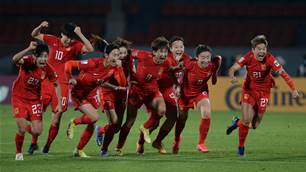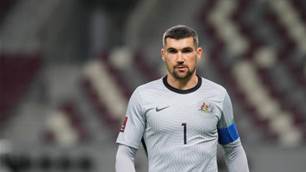Long recognised as a sleeping giant of the football world, China hosted the last Asian Cup in 2004.
In front of their home fans, the Chinese progressed to the final, riding a wave of momentum that swept aside Indonesia, Qatar, Iraq and Iran. It was only three dubious Japanese goals that ended the home team’s run and prevented China from claiming its first ever Asian Cup.
Following its competent debut at the World Cup finals in 2002, and then its near-triumph in 2004, China was seen to be finally fulfilling its footballing potential and becoming an Asian force in the sport. The People’s Republic had arrived at last! Or so it was thought.
Looking back however, the excellent Asian Cup performance in 2004 was little more than a false dawn and China’s arrival as an Asian power was perhaps heralded prematurely. Since 1960, the cup hosts have finished in the top three sides on all but three occasions – the tournaments in minnows Singapore, Qatar and Lebanon. Of those 12 tournaments, the hosts have been champions on six occasions.
Not long after its Asian Cup performance, the Chinese side was out of the 2006 World Cup qualifiers, having failed to overcome Kuwait in their preliminary group. The 2004 Asian Cup was a step in the right direction, but the failed World Cup campaign showed football in China was still a work in progress. The domestic game was, and has continued to be, wrecked by instability and corruption, while football still cannot capture the public’s imagination to the extent that basketball has with NBA star Yao Ming.
“What China football needs is a trophy,” Olympic coach Ratomir Dujkovic says. “This is why football in China is not so popular — like basketball, like table tennis, like badminton or gymnastics.”
China’s emergence on the world football scene therefore is blocked by a chicken and egg conundrum. The country will never become a world player until its people become passionate about football, but this will never happen until the national team secures a major achievement. The irony being of course that only when football hits the mainstream in China will the country be able to produce world-class players.
The current crop is a bunch of nearly men. Plenty ply their trade in Europe: Sun Jihai has been at Manchester City for five years, Sun Xiang is a regular player for Dutch champions PSV, Li Tie is well known in England and currently on Sheffield United’s books, Shao Jiayi is in Germany playing for Energie Cottbus, Shi Jun is in the Swiss Super League and captain Zheng Zhi has spent the last six months on loan at Charlton in the Premier League.
Yet none could claim to be stand-out players in their respective squads. Sun Jihai has been in and out of the team, Li Tie has seen little game time, Sun Xiang must usually be satisfied with a spot on the bench, Shao’s Energie Cottbus are in the lower half of the Bundesliga and Zheng’s Charlton were relegated.
China has never had a problem in producing technically proficient, fit, determined players. Although it has not yet won the Asian Cup, China has been to the semi-finals in six of the last eight tournaments. Though they can’t rightfully stand alongside the likes of Japan, Iran and Saudi Arabia as Asian football aristocracy, there is no doubt they are a consistent performer at this level. Lifting itself into Asia’s upper echelons is China’s challenge, and one that sadly looks out of reach for the current playing squad.
When Dong Fangzhuo signed for Manchester United it was thought he could be China’s footballing Yao Ming. Yao has not only made basketball’s profile in China boom with his success in America’s NBA, he has made the Chinese basketball team internationally competitive. Dong, a striker, seemed to have natural goal-scoring ability that could propel China’s football towards Asia’s best. However, his career has not yet really kicked off. Though he has performed ably in Belgium while on loan, he has yet to make his mark at Manchester United. Nor, it must be said, with the national team – he has scored just once in 10 international matches. Still, Dong is just 22 and looks likely to be a long-term performer in one of Europe’s top leagues, and one of China’s danger-men for the next decade.
Apart from Dong, China will be relying on experienced striker Li Jinyu for goals. Li is in good form for Chinese side Shandong Luneng, who knocked Adelaide United out of the Asian Champions League. In May he claimed the record for Chinese Super League’s highest ever scorer, taking the record from the legendary Hao Haidong.
China’s other well-known domestic star is defender and former captain Li Weifeng. Although likely to go to Malaysia, he was suspended from international duty by the Chinese Football Association due to a poor disciplinary record for both club and country. He brings a physicality and leadership to the defence, but his wild approach may prove to be a liability.
With pressure on coach Zhu and a difficult group with tournament heavyweights Iran and dangerous outsiders Uzbekistan, China will do well to progress to the knockout stage. Their third match against Uzbekistan looms as one that is likely to have a significant bearing on the entire group.
FourFourTwo verdict
Qualifying from its group will provide
a challenge, anything beyond that will be
a good result.
Following its competent debut at the World Cup finals in 2002, and then its near-triumph in 2004, China was seen to be finally fulfilling its footballing potential and becoming an Asian force in the sport. The People’s Republic had arrived at last! Or so it was thought.
Looking back however, the excellent Asian Cup performance in 2004 was little more than a false dawn and China’s arrival as an Asian power was perhaps heralded prematurely. Since 1960, the cup hosts have finished in the top three sides on all but three occasions – the tournaments in minnows Singapore, Qatar and Lebanon. Of those 12 tournaments, the hosts have been champions on six occasions.
Not long after its Asian Cup performance, the Chinese side was out of the 2006 World Cup qualifiers, having failed to overcome Kuwait in their preliminary group. The 2004 Asian Cup was a step in the right direction, but the failed World Cup campaign showed football in China was still a work in progress. The domestic game was, and has continued to be, wrecked by instability and corruption, while football still cannot capture the public’s imagination to the extent that basketball has with NBA star Yao Ming.
“What China football needs is a trophy,” Olympic coach Ratomir Dujkovic says. “This is why football in China is not so popular — like basketball, like table tennis, like badminton or gymnastics.”
China’s emergence on the world football scene therefore is blocked by a chicken and egg conundrum. The country will never become a world player until its people become passionate about football, but this will never happen until the national team secures a major achievement. The irony being of course that only when football hits the mainstream in China will the country be able to produce world-class players.
The current crop is a bunch of nearly men. Plenty ply their trade in Europe: Sun Jihai has been at Manchester City for five years, Sun Xiang is a regular player for Dutch champions PSV, Li Tie is well known in England and currently on Sheffield United’s books, Shao Jiayi is in Germany playing for Energie Cottbus, Shi Jun is in the Swiss Super League and captain Zheng Zhi has spent the last six months on loan at Charlton in the Premier League.
Yet none could claim to be stand-out players in their respective squads. Sun Jihai has been in and out of the team, Li Tie has seen little game time, Sun Xiang must usually be satisfied with a spot on the bench, Shao’s Energie Cottbus are in the lower half of the Bundesliga and Zheng’s Charlton were relegated.
China has never had a problem in producing technically proficient, fit, determined players. Although it has not yet won the Asian Cup, China has been to the semi-finals in six of the last eight tournaments. Though they can’t rightfully stand alongside the likes of Japan, Iran and Saudi Arabia as Asian football aristocracy, there is no doubt they are a consistent performer at this level. Lifting itself into Asia’s upper echelons is China’s challenge, and one that sadly looks out of reach for the current playing squad.
When Dong Fangzhuo signed for Manchester United it was thought he could be China’s footballing Yao Ming. Yao has not only made basketball’s profile in China boom with his success in America’s NBA, he has made the Chinese basketball team internationally competitive. Dong, a striker, seemed to have natural goal-scoring ability that could propel China’s football towards Asia’s best. However, his career has not yet really kicked off. Though he has performed ably in Belgium while on loan, he has yet to make his mark at Manchester United. Nor, it must be said, with the national team – he has scored just once in 10 international matches. Still, Dong is just 22 and looks likely to be a long-term performer in one of Europe’s top leagues, and one of China’s danger-men for the next decade.
Apart from Dong, China will be relying on experienced striker Li Jinyu for goals. Li is in good form for Chinese side Shandong Luneng, who knocked Adelaide United out of the Asian Champions League. In May he claimed the record for Chinese Super League’s highest ever scorer, taking the record from the legendary Hao Haidong.
China’s other well-known domestic star is defender and former captain Li Weifeng. Although likely to go to Malaysia, he was suspended from international duty by the Chinese Football Association due to a poor disciplinary record for both club and country. He brings a physicality and leadership to the defence, but his wild approach may prove to be a liability.
With pressure on coach Zhu and a difficult group with tournament heavyweights Iran and dangerous outsiders Uzbekistan, China will do well to progress to the knockout stage. Their third match against Uzbekistan looms as one that is likely to have a significant bearing on the entire group.
FourFourTwo verdict
Qualifying from its group will provide
a challenge, anything beyond that will be
a good result.
Related Articles

2022 AFC Women's Asian Cup semi-final results: Upset done and new finalist

Infallibility lost, Socceroos insist ‘we’re heading in the right direction’













